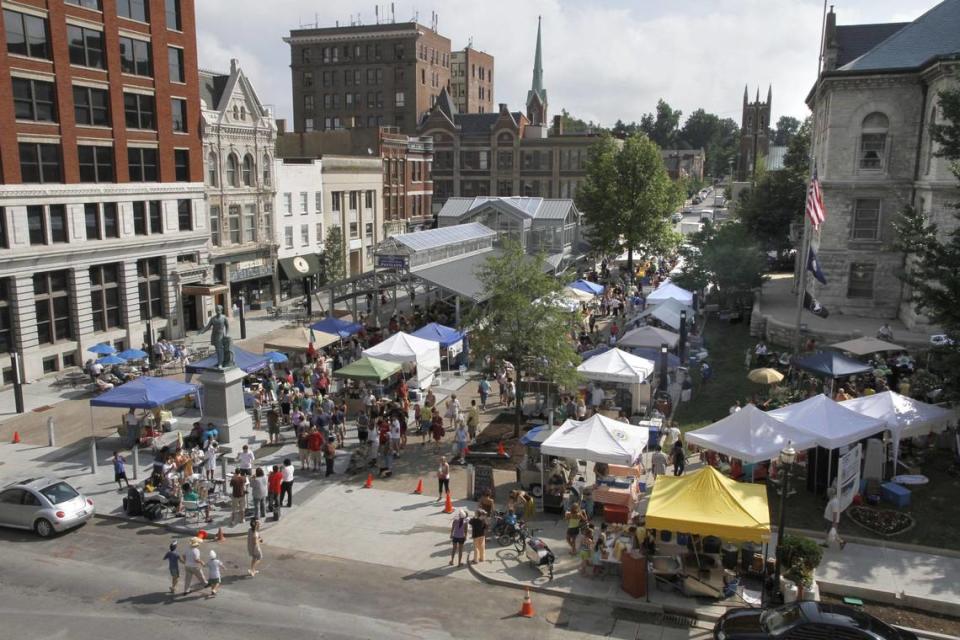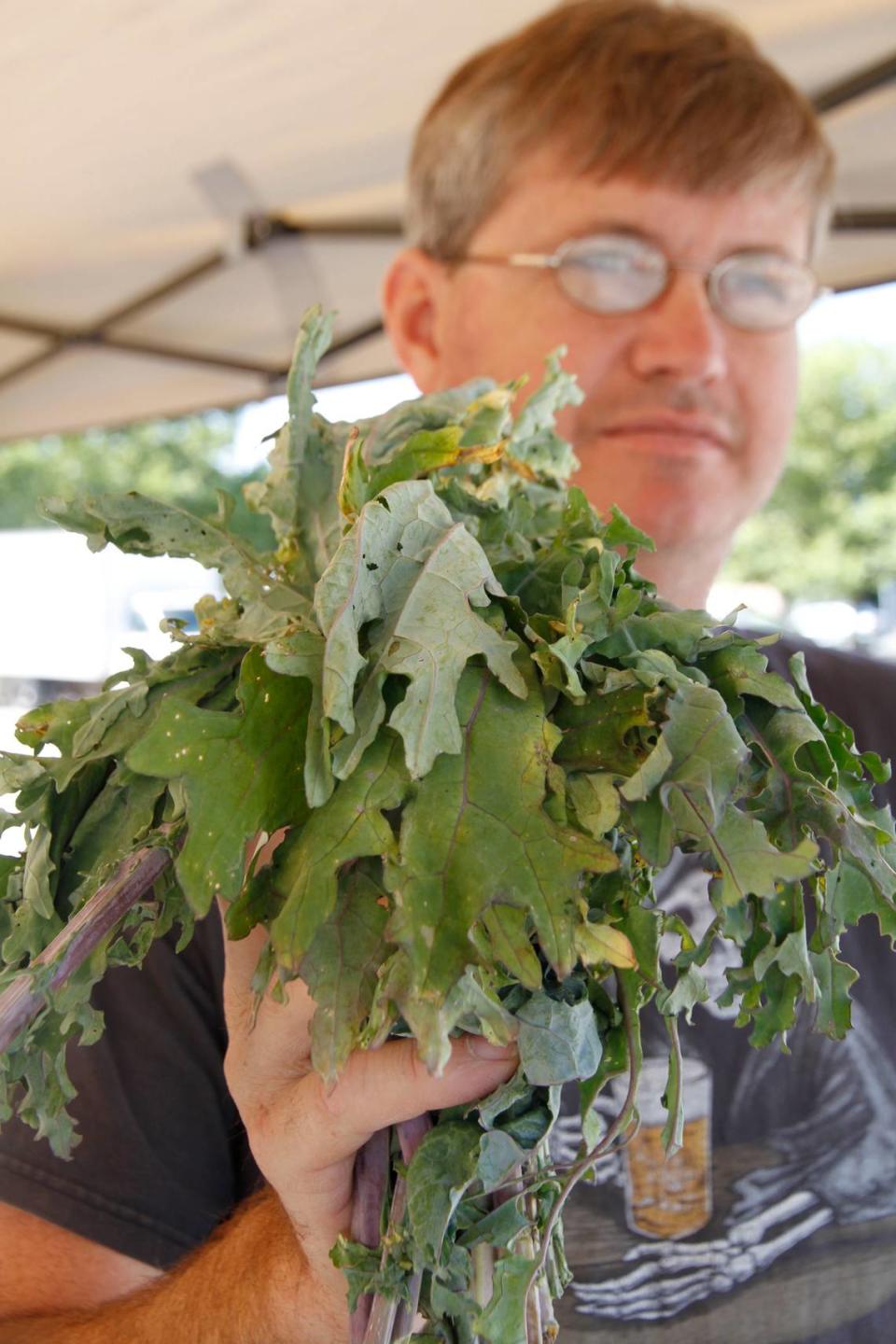Lexington OKs millions for new, permanent home for farmers market out of COVID money
The Lexington council has tentatively approved up to $168 million in projects that could be funded through American Rescue Plan Act money over the next two years.
The problem?
The city will only receive $120 million in federal coronavirus relief money over the next two years.
During Thursday’s marathon five-hour meeting to discuss potential projects to be funded through coronavirus relief money, Lexington Chief Administrative Officer Sally Hamilton told the council that city administrators will determine what projects would qualify for federal coronavirus relief money and what projects would not. The city may also be able to fund some of the projects through borrowing, dipping into a $28 million city savings account or possibly funding projects in the next year’s budget.
Hamilton said the city will also vet the full list to determine final costs. Construction costs are climbing significantly, she said.
The council may also have to trim its wish list, said Vice Mayor Steve Kay.
That means council likely won’t make any final decisions until January, after it returns from its winter break.
In addition to the federal American Rescue Plan Act money, the city may be in line for federal infrastructure funds, recently approved by Congress in early November. However, those funds likely will have more restrictions than American Rescue Plan Act money, said Erin Hensley, the city’s finance commissioner.
Some of the initiatives and projects tentatively approved on Thursday include:
$10 million towards updates in the city’s parks master plan including improvements to sports courts and community centers
$10 million to build out Cardinal Run North off of Parkers Mill Road, which is now vacant property
$10 million for a youth sports complex
$1.2 million for additional improvements and new sections of trail
$1 million for disc golf at Coldstream Park off of Georgetown Road for a new disc golf course (to be funded out of savings)
$2.5 million to improve urban tree canopy
$2 million to help relocate and expand Bluegrass Community and Technical College’s dental hygiene program to Newtown Pike campus from University of Kentucky campus
$21.5 million for critical government needs including $5 million to replace police vehicles and $6.1 million to replace fire trucks, other vehicles
$17.5 million to build out infrastructure needs at the proposed 200-acre Coldstream industrial park off of Georgetown Road
$10 million for a pool for other economic development needs
$1 million to help with the construction of a new Village Branch Library off of Versailles Road
$9.7 million to build a permanent full-time indoor and outdoor home for the Lexington Farmers’ Market on Oliver Lewis Way (matching funds required)
$8 million to cover administrative costs to administer the money and contingency money for cost over-runs for construction projects
Money for youth sports complex, disc golf
Some of the debate during Thursday’s meeting focused on $10 million for a youth sports complex.
The proposal would allow the city to put out request for proposals for a private group to run the sports complex. The $10 million would go to purchase land for the complex.
Many council members supported the proposal, saying the city could vet the proposals before it committed any money.
“It’s a valuable opportunity and it’s great economic development,” said Councilman Preston Worley.
Others said they wanted to hear more. Councilwoman Susan Lamb wanted to discuss the project with other economic development initiatives but ultimately withdrew her motion to do so.
“What’s the best use of these funds? It’s one of the projects that I have the most questions about and it’s value to the community,” said Kay.
Proponents of a new youth sports complex have pushed the city to invest in similar projects in prior years. However, economic analysis at the time showed the taxes generated from increased visitors who may come for tournaments largely goes to state coffers. Sales taxes go to the state. Hotel taxes go to the state and other entities, but not to the city. City-run large tournament-level complexes run at a loss.
Lamb was ultimately the only council member to vote against the proposal.
In addition, the council tentatively set aside $1 million from a city savings account to build a new pro and amateur level disc golf course in the Coldstream Station area off of Georgetown Road. The Bluegrass Disc Golf Association, which helps maintain the city’s other disc golf courses on the south side of town, has been discussing a new disc golf course on the city’s north side for years, said Councilman Josh McCurn.
The $1 million would go toward building out the course, installing restrooms and a pavilion as well as trails and other park amenities, said Monica Conrad, the city’s director of parks. The goal is to develop a premiere disc golf course that could host regional tournaments, she said.

Moving Farmers Market
The council also tentatively agreed to give up to $9.7 million to build a new permanent home for the Lexington Farmers Market in Davis Bottom off of Oliver Lewis Way. The council also asked the Farmers Market to apply for state agricultural grants and other funds to cover up to half the cost of the new building.
Councilwoman Hannah LeGris said moving the Lexington Farmers Market to Davis Bottom would allow lower income neighborhoods more access to local, fresh produce. That area is now a food desert.

Moreover, the Lexington Farmers Market on Saturday in Tandy Park next to the former Fayette County Courthouse is running out of space. There is no room for the market to expand and attract new vendors. The proposed new building would allow a permanent, year-round home for the market, she said.
Councilman James Brown, whose district includes downtown, questioned if the Farmers Market moving to Davis Bottom would detract from downtown businesses which depend on the Saturday Farmers Market to attract crowds and foot traffic.
Also, Brown questioned whether moving the market away from downtown would mean fewer minorities would have access to the market and fresh foods.
Ashton Potter Wright, the city’s director of local food and agricultural development, said the market on Tuesday and Thursdays is in the parking lot of Central Bank Center on South Broadway.
Potter Wright said the clientele at the South Broadway market is much more diverse than the one downtown on Saturdays.
Also, the main complaint of people trying to come to the Saturday Farmers Market is lack of parking, she said.
The proposed indoor-outdoor space would have plenty of parking. It would also have cold storage facilities for farmers to store product as well as community space to allow others to use the building, she said.
The council ultimately agreed to fund the project if the market receives funding from other sources including Kentucky agricultural development funds.
Other projects already approved
Prior to Thursday, other projects and initiatives the council has either given tentative approval or has already funded through American Rescue Plan Act money includes:
$10 million for affordable housing
$12. 4 million for housing stabilization and homelessness initiatives
$15 million for one-time supplemental pay for city employees
$1 million to VisitLex for tourism-related initiatives
$9 million for nonprofit capital improvement projects
$991,000 to expand a minority business accelerator

 Yahoo Movies
Yahoo Movies 
